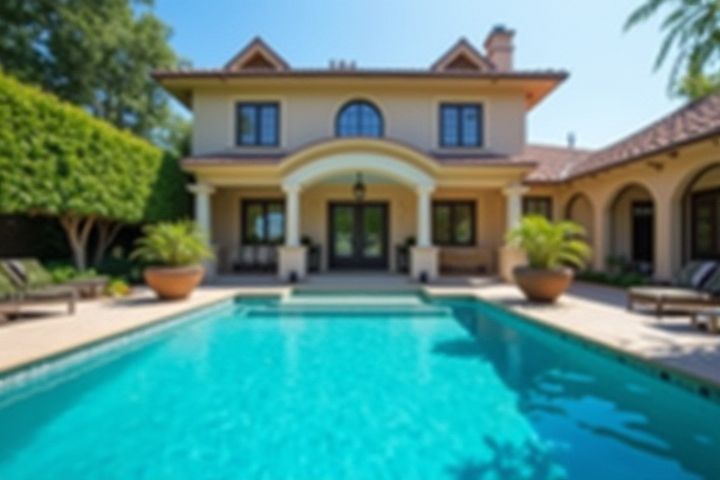
A house with a pool can present unique challenges when it comes to selling. Potential buyers may have concerns about safety, maintenance, and ongoing costs associated with pool ownership. In some markets, pools may be seen as a luxury, making the home less appealing to budget-conscious buyers. Conversely, in warmer climates, a pool can enhance property value and attract buyers seeking outdoor living options. Ultimately, the impact of a pool on resale value largely depends on location, buyer preferences, and overall market trends.
Is A House With A Pool Harder To Sell
Maintenance costs
A house with a pool typically incurs higher maintenance costs, which can deter potential buyers. Regular upkeep, including cleaning, chemical balancing, and repairs, can average between $1,200 to $1,800 annually, significantly impacting your budget. Moreover, homeowners should consider the added liability insurance costs, which can increase by approximately 10-15% with a pool. This financial burden can make your property less appealing in a competitive real estate market, ultimately affecting its saleability.
Insurance premiums
A house with a pool typically incurs higher insurance premiums due to the increased liability risk associated with water features. Homeowners can expect to pay an average of 10% to 15% more on their insurance coverage compared to similar properties without a pool. Additionally, properties with pools may also require additional safety measures, such as fences or covers, which can further impact your insurance costs. Understanding these factors is crucial when considering the potential resale value of your house with a pool.
Regional climate
In regions with warmer climates, such as Florida and Southern California, houses with a pool often have a competitive advantage, appealing to buyers seeking a lifestyle enhancement. Conversely, in cooler areas like the Northeast or Pacific Northwest, a pool may be viewed as an unnecessary expense, potentially making such homes harder to sell. Research indicates that homes with pools in these less temperate zones can see a decrease in demand, influencing property values by approximately 5-10%. Therefore, understanding your local climate can significantly inform your decision on purchasing a home with a pool.
Safety concerns
A house with a pool can pose safety concerns, particularly for families with young children or pets, making potential buyers hesitant. According to the Consumer Product Safety Commission, an average of 200 children drown in swimming pools annually in the United States, amplifying fears about pool ownership. Homebuyers may consider additional costs related to pool safety measures, such as installing fences or pool covers, which can deter them from making an offer. To appeal to buyers, you can emphasize safety features like alarms, clear sightlines, and age-appropriate fencing that mitigate these concerns.
Increased property value
A house with a pool can significantly boost your property value, often increasing it by 7% to 15%, depending on the location and market conditions. In warmer climates, homes featuring a pool may attract a larger pool of buyers, enhancing their appeal and marketability. However, potential buyers might also consider maintenance costs and safety concerns, which can impact their decision. To maximize your pool's impact on resale value, regular upkeep and proper landscaping around the area are essential.
Target buyer demographics
A house with a pool can attract specific target buyer demographics, particularly families, young professionals, and affluent individuals who value outdoor leisure and entertainment opportunities. These buyers often seek properties that enhance their lifestyle, making such homes more desirable in warmer climates or regions with a vibrant social scene. However, potential buyers may also consider factors like maintenance costs, safety for children, and regional climate before purchasing, which can affect marketability. Understanding your local real estate trends and buyer preferences is crucial when selling a house with a pool to ensure successful transactions.
Pool condition
A pool in a house can significantly influence its marketability, depending on the condition of the pool. A well-maintained pool, featuring clean water, a functional filtration system, and a safe surrounding area, can enhance the property's appeal and potentially elevate its resale value by 7-15%. Conversely, a neglected pool, with issues such as cracks, green water, or outdated equipment, can deter potential buyers and may lead to a price reduction of up to 20%. Buyers often perceive a poorly maintained pool as an expensive burden, impacting their overall impression of the property.
Local real estate trends
In many local real estate markets, a house with a pool can either enhance or hinder its saleability, greatly depending on regional preferences. For instance, in warmer climates like Florida or Arizona, having a pool is often viewed as a desirable feature, potentially increasing home value by 5-10%. Conversely, in colder regions, buyers may see a pool as an additional maintenance burden, which can negatively impact selling prices by similar margins. It's important to analyze your specific neighborhood trends, as homes in areas known for outdoor living are likely to attract buyers more readily than those where pools are less valued.
Seasonal appeal
Houses with pools often sell quicker in warmer regions, especially during spring and summer months when outdoor living is most appealing. In contrast, during the colder seasons, the pool may detract buyers who prioritize year-round usability over seasonal enjoyment. Additionally, properties with pools tend to require higher maintenance costs, which can deter budget-conscious buyers. If you're considering selling, emphasizing the pool's benefits for summer gatherings can significantly enhance your home's marketability.
Market competition
In the competitive real estate market, homes with pools can either attract buyers looking for luxury or deter those concerned about maintenance and costs. According to recent market analysis, properties with pools often face a 15% longer time on the market compared to similar homes without one. The demand for pools can vary significantly by region, impacting your home's resale value; for instance, in warmer climates, a house with a pool may be more sought after, increasing its desirability. However, in cooler areas, the appeal may diminish, leading to a potential price reduction of up to 10% for homes with pools.
